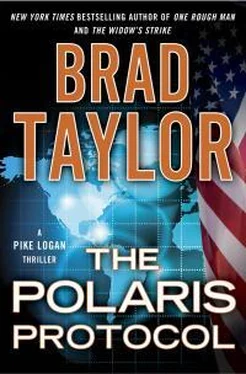He said, “Knuckles doesn’t have a brother.”
She took a breath and exhaled. “Just say he did, would he have gone to Mexico?”
He thought, and said, “Yes.”
“Would you have come and helped him, if he’d called, using whatever means were at your disposal?”
He nodded slowly. “Yes. I would have.”
“Then what the hell are we talking about?”
Pike closed his eyes for a moment. “You really twist up what I’m thinking.”
She squeezed his hand and said, “No I don’t. Others are doing that. And you know it.”
He let go of her hand and put the car in drive, saying nothing. She said, “You know that, right? I wouldn’t stay if I thought what you said was true.”
He said, “I know. It’s just that we can’t be pulling shit like this. The other times you mentioned were for national security. Averting risks to our nation, not something personal like this. It was wrong.”
She said, “Listen to the tape. I don’t think it’s just personal. I think it’s a Taskforce problem. Something bad’s going on, and I think it affects national interests.”
As she pulled out the recorder he said, “Jennifer, drugs might be a national problem, but they’re not Taskforce business. There’s a whole agency dedicated to that.”
She said, “Just listen. Jack might have been working on the cartels, but he found something different. There’s an American on here talking about something much bigger than drugs.”
“What?”
“Our GPS constellation.”
19
Not for the first time, Arthur Booth considered bringing mittens with him to work. The temperature inside his trailer was damn near freezing due to the number of servers, and it wasn’t like he was going to be banging away on a keyboard any time soon. Well, unless there was an anomaly in the system, which had happened only a few times since the Air Force officially accepted the latest upgrade to the GPS Architecture Evolution Plan.
Located behind the wire on one of the largest secure areas within the Department of Defense, the trailer was nowhere near as nice as the control room it supported two hundred meters away, but it was supposed to be temporary, and anything beyond the barest of requirements was a waste of money in the eyes of the defense contractor that maintained it.
Boeing had won the bid to create the next-generation Global Positioning System and had been working nonstop for over a decade to implement it. Designed to replace the aging, monolithic mainframes with a distributed network, along with launching more robust and capable satellites into space, it was an enormous undertaking that had to be accomplished seamlessly. Sort of like upgrading a propeller aircraft to a jet-capable one—while the aircraft continued to fly. Given the criticality of the system, it couldn’t be treated like cable TV, where the United States could tell the world, “Sorry for the inconvenience, but GPS will be experiencing some unpredictable outages over the next ten years… .”
And so Boeing built the system with robust backups, monitoring the architecture on a twenty-four/seven clock. The new AEP operational control segment at Schriever Air Force Base was fully functional now, monitoring the health of the global constellation of satellites, and Boeing, using Booth’s station, monitored the health of the control segment, reacting to any anomaly it found.
Booth, however, was watching for a very different reason. He wanted an anomaly. Wanted official access to the control segment. Wanted to be able to ostensibly solve a problem while introducing a new one.
Booth was a hacker and always had been, although he would say he was of the breed known as “ethical.” With ethics being decidedly in the eye of the beholder. He never compromised systems for financial gain, like eastern European Mafia groups, or for general mayhem, like a high school script kiddie defacing a pop star’s website. He only hacked for what he perceived as the greater good, exposing corporations and government evil, as it were.
Hacking, in and of itself, was nothing more than unauthorized penetration of computer systems. It was an action, not an attribute that could be spotted across a room at a party, and thus, like the group he sometimes worked with, he remained anonymous. The same skills he employed as a hacker were in great demand in his work as a computer technician, and thus he commanded a significant salary from Boeing, complete with a secret security clearance.
His initial foray into government employment had been with the CIA, where he’d applied to work in a cell developing some decidedly nefarious computer applications, something at the time he’d thought would be right up his alley, using his skills for the greater good in defense of the nation and gaining a sense of self-worth he couldn’t obtain by writing code designed to increase advertising sales. Unfortunately, he couldn’t pass the lifestyle polygraph test, which was designed to determine if there was a risk in exposing an applicant to national secrets. Apparently, he had been deemed risky and had been denied employment. Luckily for him, there was no such thing as cross talk among the divisions of the government, and Boeing didn’t require anything more than a background check, which had come up pristine.
Booth finished the initial survey for his shift and sat down, exhaling hard in an attempt to see his breath in the cold air but coming up empty. Having nothing else to do, he turned on his personal laptop after inserting a thumb drive with a boot segment that would control the laptop’s operating system. He placed his thumb on a small biometric scanner at the base of the keyboard and unlocked the system. Wading through various partitions, he pulled up an executable file called POLARIS.
He absently tapped the interface, checking for any glitches from his programming the night before, proud of his chosen name. Polaris was the North Star, which was the old-school, analog GPS that had guided navigation for centuries. He thought the name very apt, as the program would revert the world back to using it.
The executable file seemed to work fine and, in truth, would have worked fine a week ago. All he was doing now was refining the aesthetics of the interface while he waited to inject it into the GPS constellation, changing it from code only a computer maven could understand into an intuitive screen that anybody could use.
Booth hadn’t come into Boeing with any intent to harm. He wasn’t a mole who had spent decades wheedling his way into the inner circle. He was just a guy with expertise in computers who needed a day job so that he could execute his night activities and still eat. He worked so that he could work, righting the wrongs of the world as he saw them. That notion had changed as he became aware of the extent to which the GPS system controlled government and corporate actions. The satellite constellation was a sterile machine that did nothing but send out streams of ones and zeros. But the people who used the signals did some pretty nasty things.
Booth had worked with the hacktivist group Anonymous on multiple occasions and had even taken leave to protest Wall Street during the heady days of the Occupy movement—wearing the ubiquitous Guy Fawkes mask that was an Anonymous hallmark—but those had always been separate and distinct from his work at Boeing. It wasn’t until the United States government began killing its own citizens in Predator drone strikes that he decided to act.
The solution had been elegant in its simplicity, and he’d often wondered why he didn’t think of it before. He’d marched on Wall Street using analog methods when the digital destruction of that enterprise was staring him in the face the entire time.
GPS had been created solely as a military application, and as such it had been designed with safeguards in mind. Since the satellites blindly launched signals continuously, the military was worried that the very position, navigation, and timing features that would allow US smart weapons technology to dominate a future battlefield could also be used by an enemy, and they were determined to prevent that from occurring.
Читать дальше












